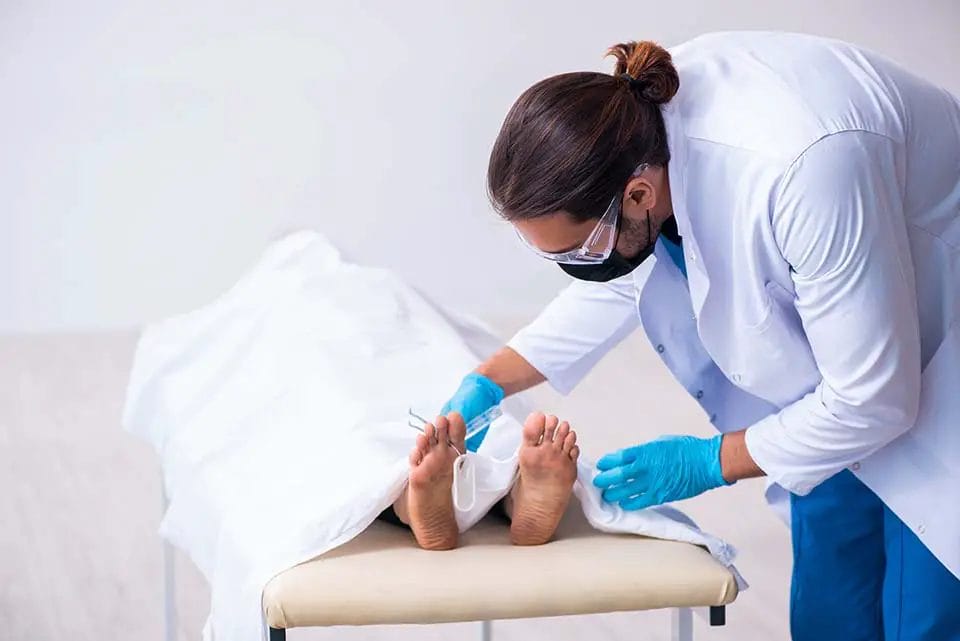- Autopsies can be free if the Medical Examiner or Coroner’s office requests it (usually with traumatic and accidental deaths)
- ‘Private’ autopsies are not covered by any health insurance, including Medicare, and Medicaid and therefore will have to be paid out of pocket (Source)
- According to the American Board of Pathology, the price for a private autopsy in the United States is typically between $1,500 and $3,000. This can vary depending on where you live and what type of procedure the deceased person needs to be done (Source)
- Research by CAP(College of American Pathologists) shows that the median price for a forensic autopsy is $2,175 in the US. There is a great deal of variation, with prices ranging from less than $1,000 to more than $5,000 (Source)
- According to the North Carolina Board of Funeral Service, autopsy costs typically range from $300 to $1,000+ depending on location and factors such as whether or not the body will be embalmed (Source)
- According to the Louisiana State University research, the average autopsy cost in Louisiana is $2,643 (Source)
Are Autopsies Free: Private v.s. Public
When performed through the Medical Examiner’s or Coroner’s offices in the USA, autopsies are (tax-funded) free.
The death needs to be under the jurisdiction of the Medical Examiner. Each state has its own laws regarding what is covered. Most deaths with trauma, suicide, homicide, and accident are covered. Natural deaths are sometimes covered.
However, just because you have been declared dead by the ME/Coroner, does not mean that you will receive a complete autopsy. Sometimes, they will only do a partial autopsy. In many cases, they will only perform an external examination, many cases with toxicology, CT scan, and X-rays.
This will not result in any additional charges. To obtain copies of the autopsy report for your loved one, you may need to pay a small amount (Source).
Cost Factors
An autopsy is a procedure that is used to examine a dead body. There are many reasons why an autopsy may be performed, including to determine the cause of death, to identify a deceased person, or to investigate the nature of a disease. The cost of an autopsy can vary depending on the hospital or clinic where it is performed.
1. Pathology lab fees
Autopsy cost varies depending on the pathology laboratory fees charged by the hospital or clinic performing the procedure. Many laboratories that are part of a large healthcare organization have more resources available than laboratories that are part of smaller facilities, allowing them to charge more for their services.
If you are considering having an autopsy performed, you can ask the pathology laboratory about its fees and whether they vary depending on the kind of autopsy performed.
2. Location of the autopsy

The location where an autopsy is conducted can also determine how much it costs to have one performed.
Pathology laboratories within large hospitals tend to be located in areas that are considered more desirable or convenient because they are often close to operating rooms or patient wards, allowing them to better serve their clients.
Laboratories that are part of smaller facilities might not be in such convenient locations, and may also have fewer resources available. Because of this, pathology laboratories that are part of larger hospitals tend to charge more for their services.
3. Time of the autopsy

The time it takes for a pathologist to perform an autopsy can often be one of the biggest contributors to the overall cost of having one done. If a physician schedules an autopsy to be performed as soon as possible, or during another physician’s shift, it is unlikely that the pathologist will have any breaks in his or her schedule and will not be required to stay late.
In such cases, the hospital may charge more for this type of service than if the pathologist had to stay late or if the autopsy was performed during a time when fewer doctors are working.
4. Number of Autopsies Performed at One Time
If multiple autopsies are being performed, the cost may be lower per autopsy because you are sharing the overall costs with other patients who need an autopsy. If multiple autopsies are being performed at the same time, it can also allow the pathologist to complete the procedure more quickly, which can save on costs.
5. Complexity of the autopsy
The complexity of an autopsy can also affect how much it costs to have one performed. If a pathologist needs to order specialized tests or equipment to perform an autopsy, the hospital or clinic may charge more for the procedure. If a pathologist needs to order additional tissue samples for testing, this can also increase the cost of an autopsy.
6. Type of autopsy

Different types of autopsies can be performed, and each one has its own set of fees. A basic autopsy, which is the most common type, is a procedure that involves the examination of the body’s external features, as well as its internal organs.
If a pathologist needs to order specialized tests or equipment to perform an autopsy, the hospital or clinic may charge more for the procedure. If a pathologist needs to order additional tissue samples for testing, this can also increase the cost of an autopsy.
7. Special requests from family members
If a pathologist performs an autopsy and discovers something that requires additional testing, the hospital or clinic may charge more for the procedure. In addition, if you request that your doctor perform a specific type of test during the autopsy, this can increase the cost of having one performed.
For example, if you want your doctor to test for a specific type of genetic disorder, it can incur additional charges.
8. Donation of organs and tissues following an autopsy

After a pathologist performs an autopsy, he or she might be able to recover any healthy organs and/or tissue that can be donated to other patients who need them. The hospital or clinic may charge more for the procedure if the pathologist can recover healthy organs or tissues.
9. Rush orders
If a family requests that an autopsy be performed as soon as possible, the hospital or clinic may charge more for the procedure. This is because the pathologist will need to work on a shorter schedule and may have to perform the autopsy outside of regular business hours.
10. Interpretation of autopsy results
If you need a pathologist to interpret the results of an autopsy for you, this can also increase the overall cost of the procedure. Pathologists often charge by the hour for their services, so you can expect to pay more if the interpretation will take longer than average.
Why Autopsies Are Important

It can help doctors find the cause of death
An autopsy is a procedure in which a pathologist examines a dead person’s body, including all major organs and tissues. The goal is to determine the cause of death. A doctor may recommend an autopsy if he or she suspects that you died from a disease for which there are no observable symptoms during life.
It can help doctors diagnose diseases
Autopsies can also be used to diagnose diseases in living patients. If a doctor suspects that you have a particular disease, he or she may order an autopsy to see if the disease was present in your body at the time of death. This information can help doctors develop a treatment plan for patients who have been diagnosed with the same disease.
Conclusion
Even though an autopsy can increase the cost of a funeral, it may help provide some closure to families who have lost a loved one. In addition, autopsies can help doctors diagnose diseases in living patients, aid in medical research, and more.

Hi, my name’s David. I started this pricing blog as a side project to help people figure out the best prices on common services. Whether you’re trying to figure out how much it costs to get scanning done at Staples or the expense to bleach short hair, more than likely I’ve blogged about it. Shoot me an email if you have any questions: david@mightyprice.com.